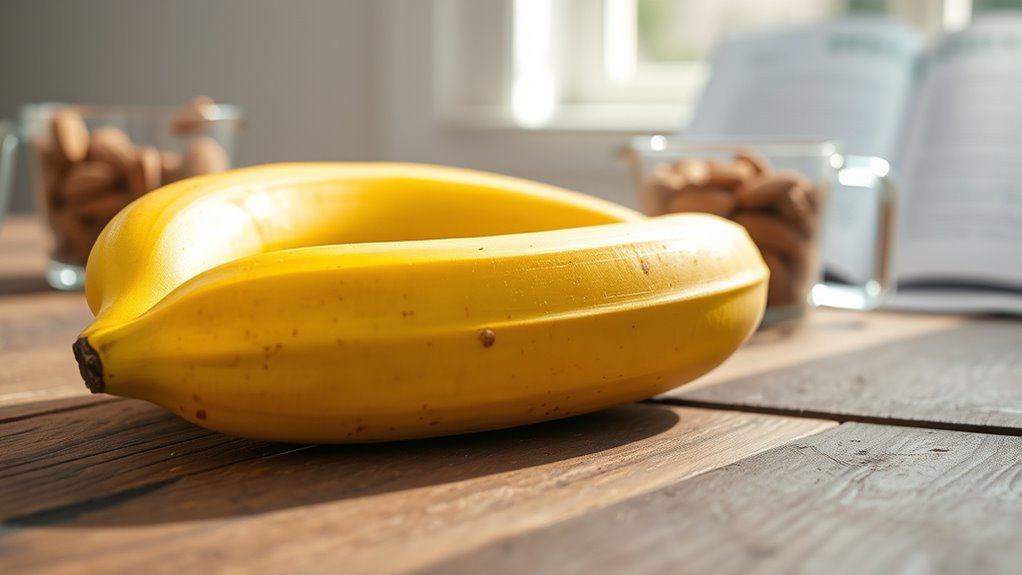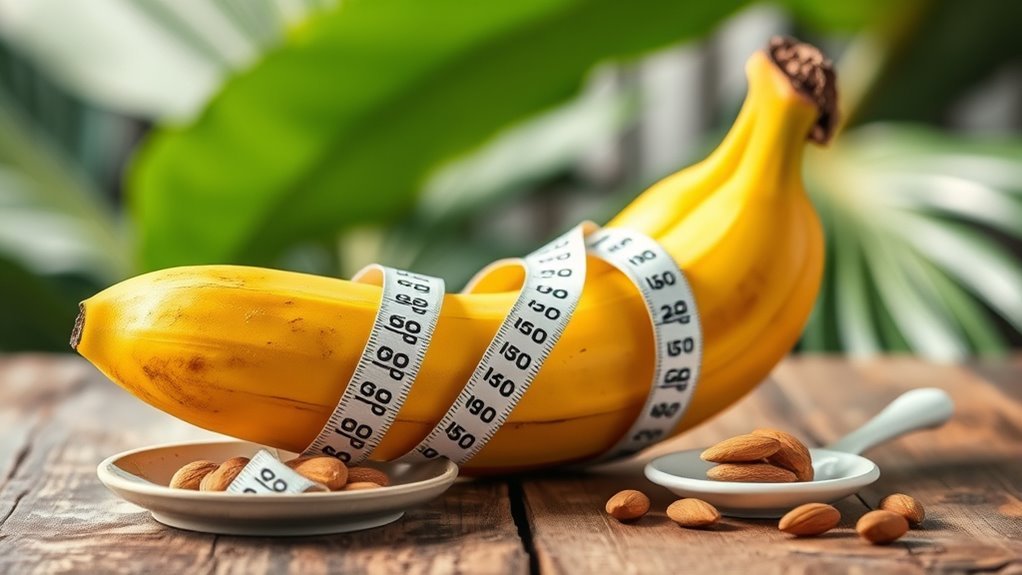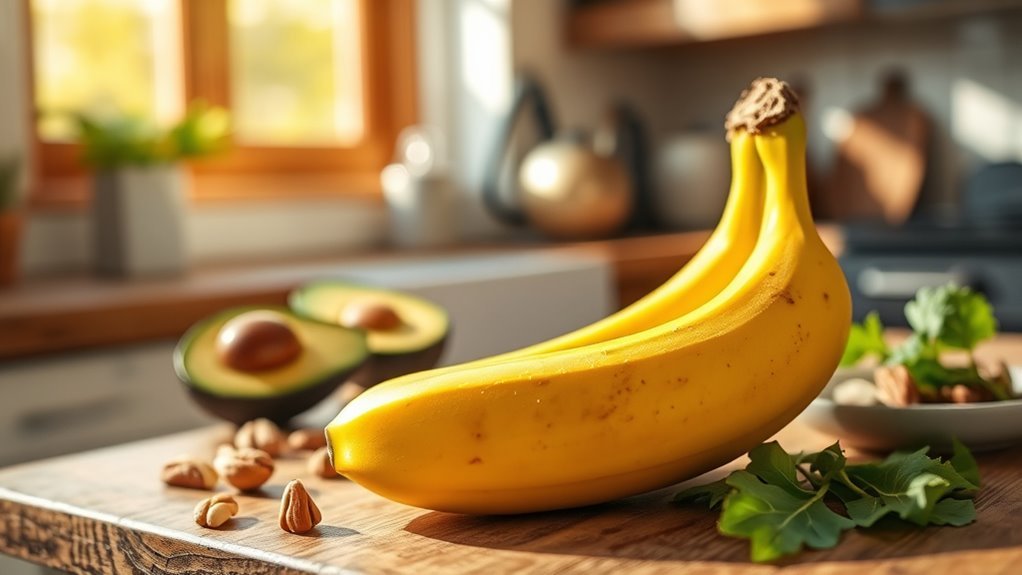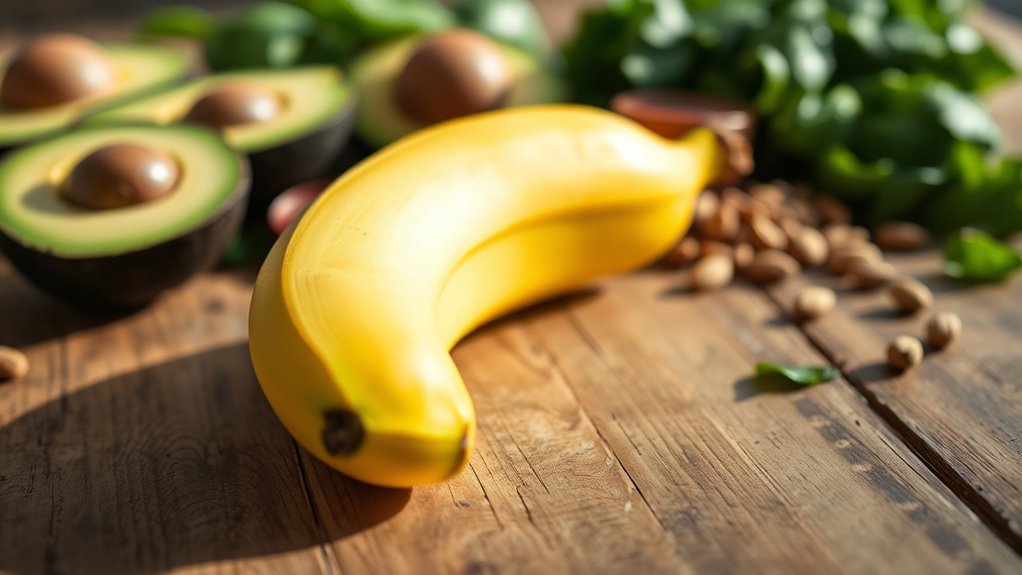You can enjoy bananas on a keto diet, but moderation is key. A medium banana contains about 27 grams of carbs, which can disrupt ketosis if you exceed your daily carb limit. If you’re craving bananas, consider eating a smaller portion or pairing it with healthy fats for balanced blood sugar. There are also plenty of low-carb alternatives that fit better within keto guidelines. Explore your options to find what works best for you.
Understanding the Keto Diet

When you commence on the keto diet, you’re fundamentally shifting your body’s primary fuel source from carbohydrates to fats. This change can lead to significant weight loss and improved energy levels, but it’s crucial to address some common keto misconceptions. Many people believe that the diet is rigid and excludes all carbs, which isn’t entirely true. In reality, there’s diet flexibility within the keto framework; it’s about choosing the right types of carbohydrates and managing your intake. You can still enjoy a variety of foods while adhering to your goals. Understanding the keto diet’s principles empowers you to make informed choices, allowing you to experience the freedom of eating delicious foods while achieving your health objectives.
Nutritional Profile of Bananas

When considering bananas in your keto diet, it’s essential to look at their nutritional profile. They’re relatively high in carbohydrates, but they also offer fiber and important nutrients that can benefit your overall health. Additionally, understanding their glycemic index can help you gauge how they might affect your blood sugar levels.
Carbohydrate Content Analysis
While bananas are often celebrated for their health benefits, their carbohydrate content raises questions for those following a ketogenic diet. On average, a medium banana contains around 27 grams of carbohydrates, which can markedly impact your daily carb limit if you’re aiming for ketosis. It’s essential to be mindful of banana varieties, as some, like plantains, can have even higher carb counts. For those committed to carb counting, choosing smaller portions or opting for lower-carb fruits may be a better strategy. If you’re craving that banana flavor, consider using extracts or incorporating banana-flavored products that fit within your dietary goals. Ultimately, moderation and awareness of your individual carb intake will guide your choices.
Fiber and Nutrient Benefits
Though bananas are often scrutinized for their high carbohydrate content, they also offer significant fiber and nutrient benefits that can be valuable in a balanced diet. Fiber plays an important role in digestion and can enhance nutrient absorption, making bananas a worthy addition to your meals.
| Nutrient | Amount per 100g |
|---|---|
| Dietary Fiber | 2.6g |
| Vitamin C | 8.7mg |
| Potassium | 358mg |
The fiber benefits in bananas can help you feel fuller longer, which may assist in managing cravings. Coupled with essential vitamins and minerals, bananas can support overall health. So, while you’re mindful of carbs, consider the nutritional advantages bananas bring to your diet.
Glycemic Index Consideration
Understanding the glycemic index (GI) of foods is vital, especially on a ketogenic diet where managing blood sugar levels is a priority. Bananas, while nutritious, have a moderate GI, which means they can cause a noticeable glycemic response.
Here are three key points to take into account:
- GI Value: Bananas rank around 51 on the GI scale, indicating a moderate effect on blood sugar.
- Carbohydrate Content: A medium banana contains about 27 grams of carbohydrates, which can impact ketosis.
- Ripeness Factor: The riper the banana, the higher its sugar content, leading to a more significant blood sugar spike.
If you’re keen on maintaining stable blood sugar levels, moderation is vital when taking bananas into account in your keto journey.
Carbohydrate Content in Bananas

Bananas are known for their sweet taste and creamy texture, but they also come with a notable carbohydrate content that can impact your ketogenic diet. A medium banana contains about 27 grams of carbohydrates, which is significant when you’re aiming for a daily intake of around 20-50 grams. When considering banana varieties, some, like the smaller “Lady Finger,” have slightly fewer carbs, but the difference isn’t drastic. In carb comparisons with other fruits, bananas often rank higher, making them less suitable for strict keto. If you’re committed to a low-carb lifestyle, you might want to enjoy bananas in moderation or choose lower-carb fruits to maintain your desired level of ketosis while still enjoying tasty options.
The Impact of Bananas on Ketosis
If you’re following a ketogenic diet, it’s important to contemplate how bananas might disrupt your state of ketosis. Their high carbohydrate content can kick you out of ketosis, so it’s vital to be mindful. Here are a few considerations:
- Carb Count: A medium banana contains about 27 grams of carbs, which can exceed your daily limits.
- Blood Sugar Spike: Eating bananas may lead to a quick spike in blood sugar, affecting your keto goals.
- Keto Snacks: If you’re craving something sweet, consider banana substitutes like berries or nuts, which align better with keto guidelines.
Alternatives to Bananas on Keto
While bananas may be tempting due to their sweetness and convenience, there are plenty of alternatives that can satisfy your cravings without derailing your keto diet. You might consider banana substitutes like avocados, which are rich in healthy fats and low in carbs. Berries, such as raspberries and strawberries, can also provide a sweet taste while remaining keto-friendly. For a quick snack, try celery sticks with almond butter or a handful of nuts, which can keep your energy up without the carbs. If you crave something sweet, sugar-free gelatin or a small portion of dark chocolate can also be delightful keto snacks. Embracing these options allows you to enjoy tasty treats while staying committed to your keto lifestyle.
Moderation: How to Enjoy Bananas
Although many people on a keto diet may steer clear of bananas due to their higher carbohydrate content, enjoying them in moderation can still fit within your daily carb limits. Here are a few tips to help you indulge wisely:
- Practice Portion Control: A small banana can be a tasty treat without derailing your keto goals. Aim for half a banana instead of a whole one.
- Pair with Protein: Combining a banana with a source of healthy fat or protein, like almond butter, can help balance blood sugar levels and keep you satisfied.
- Explore Banana Substitutes: Consider using banana-flavored extracts or small amounts of banana puree in recipes to enjoy the flavor without the carbs.
Embracing moderation allows you to savor bananas while staying true to your diet.
Recipes Incorporating Bananas for Keto
When you’re craving the unique flavor of bananas on a keto diet, there are several creative recipes that can help you enjoy them without exceeding your carb limits. One great option is banana smoothies, which can be made using just a small portion of banana blended with unsweetened almond milk, spinach, and a scoop of protein powder. This way, you’ll still get that banana taste while keeping carbs low. For a sweet treat, try making keto desserts like banana flaxseed muffins, using ripe bananas in moderation along with almond flour and flaxseed meal. This balance allows you to indulge in your cravings while adhering to your dietary goals. Enjoy experimenting with these recipes to satisfy your banana cravings!
Individual Variability in Carb Tolerance
Understanding individual variability in carb tolerance is essential for anyone following a keto diet, as everyone’s body reacts differently to carbohydrate intake. This concept emphasizes the importance of personalized nutrition and highlights how you might need to adjust your approach based on your unique metabolic flexibility.
Here are three key factors influencing your carb tolerance:
- Genetic Factors: Your genetics can determine how efficiently your body processes carbs.
- Activity Level: Active individuals may handle carbs better than those with a sedentary lifestyle.
- Gut Health: A healthy gut microbiome can enhance your metabolic flexibility, allowing for better carb management.
Frequently Asked Questions about Bananas on Keto
1. Can I eat bananas on a ketogenic diet?
While bananas are a nutritious fruit, they are relatively high in carbohydrates, which makes them less suitable for a ketogenic diet. A medium banana contains about 27 grams of carbs, which can take up a significant portion of your daily carb allowance on keto (typically around 20-50 grams). If you’re strictly adhering to a keto diet, it’s best to avoid bananas and opt for lower-carb fruits instead.
2. What fruits can I eat on a keto diet instead of bananas?
There are several lower-carb fruits that are more compatible with a ketogenic diet. These include berries such as strawberries, raspberries, and blackberries, which are lower in sugar and can be enjoyed in moderation. Avocados, although technically a fruit, are also a great option due to their high healthy fat content and low carb count.
3. What are the potential effects of eating bananas on keto?
Eating bananas on a keto diet could potentially kick you out of ketosis due to their high carbohydrate content. This can lead to a temporary halt in fat burning and may result in increased cravings for more carbs. If you consume bananas regularly, it could make it challenging to maintain the low-carb intake necessary for keto, ultimately impacting your weight loss or health goals.
4. Are there any health benefits to eating bananas?
Yes, bananas offer several health benefits. They are rich in potassium, which is essential for heart health and muscle function. They also provide dietary fiber, which can aid in digestion, and contain vitamins such as Vitamin C and B6. However, if you are following a keto diet, it’s important to weigh these benefits against the carbohydrate content.
5. Can I have bananas in small amounts on a keto diet?
While it is technically possible to consume very small amounts of banana and stay within your daily carb limits, it can be risky. Even a few slices can add up quickly in carbs. If you choose to have bananas, it’s crucial to track your intake carefully and ensure that it does not interfere with maintaining ketosis. Many people find it easier to enjoy other lower-carb fruits to avoid the temptation of larger portions of higher-carb options like bananas.
References
- https://www.healthline.com/nutrition/bananas-and-keto
- https://www.dietdoctor.com/low-carb/foods/bananas
- https://www.ncbi.nlm.nih.gov/pmc/articles/PMC7072491/
- https://www.mayoclinic.org/healthy-lifestyle/nutrition-and-healthy-eating/expert-answers/banana-and-keto-diet/faq-20451050
- https://www.webmd.com/diet/obesity/what-is-the-keto-diet
- https://www.bbcgoodfood.com/howto/guide/what-keto-diet
- https://www.theguardian.com/lifeandstyle/2020/jan/12/the-keto-diet-what-is-it-and-what-are-the-benefits
- https://www.nutrition.gov/topics/whats-food-and-nutrition/healthier-eating/guide-keto-diet


